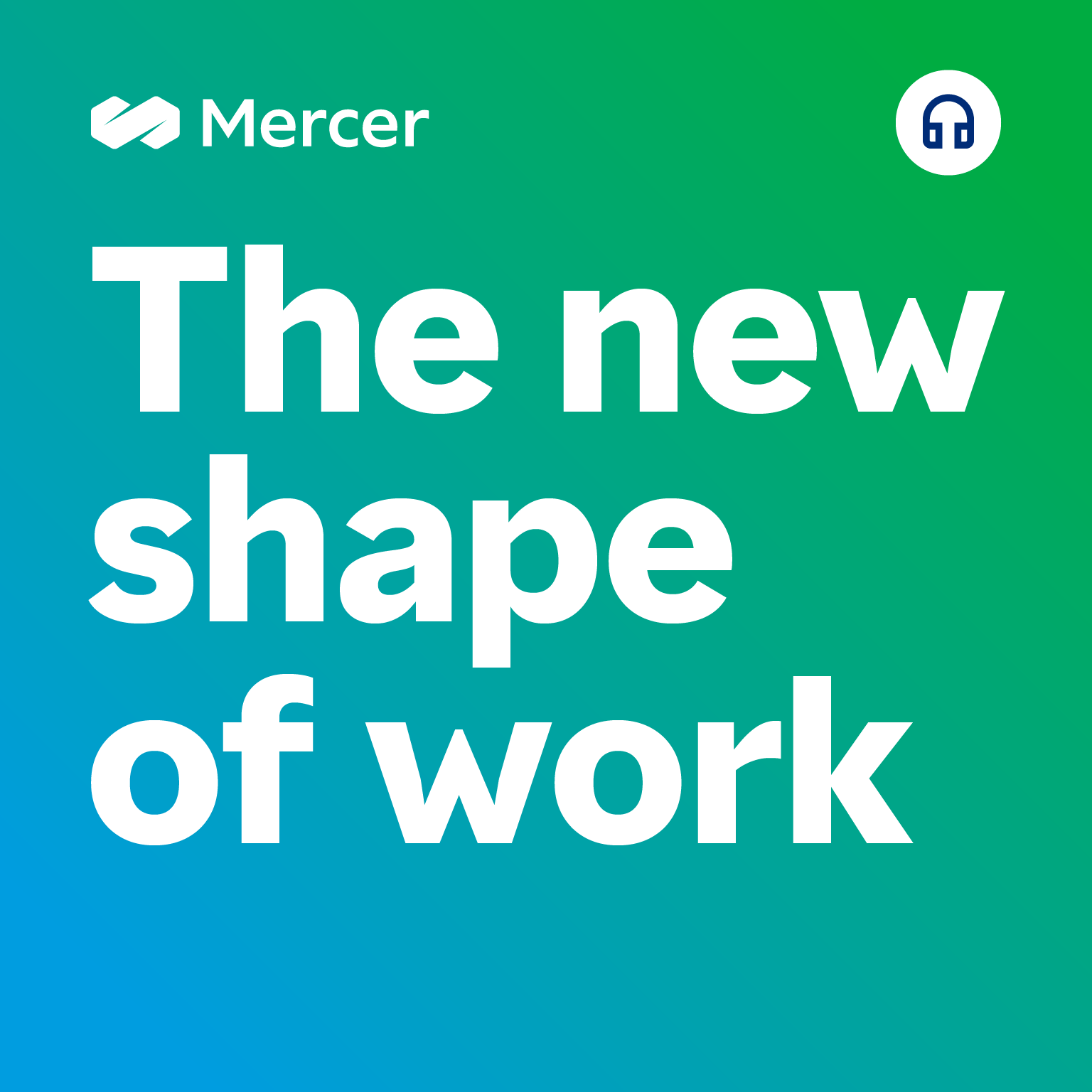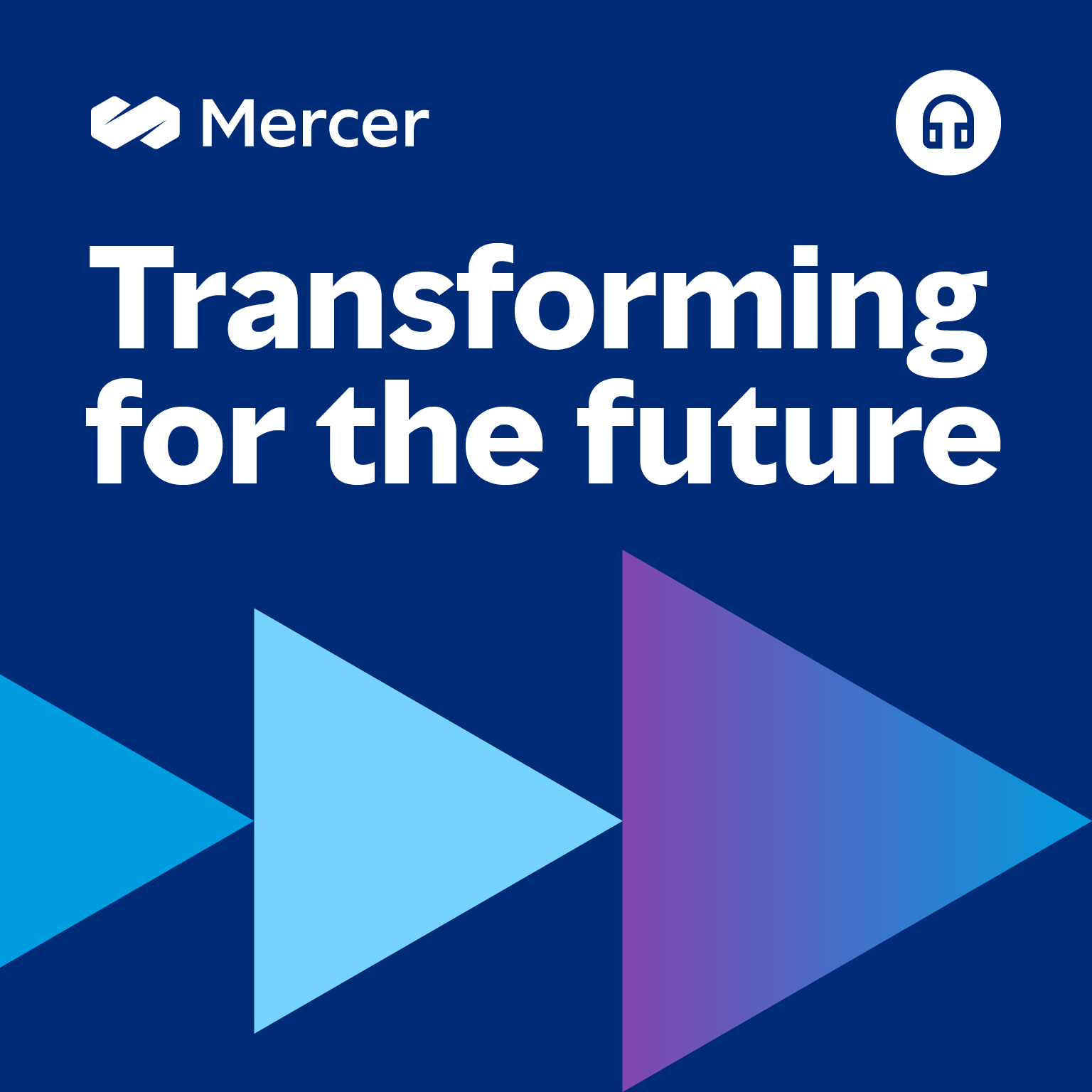[MUSIC PLAYING]
Welcome to the New Shape of Work podcast series. I'm Kate Bravery, head of talent advisory at Mercer. And today, we'll be chatting about how businesses in the Middle East and India are thriving, and the changing nature of some of the talent management and leadership challenges that we see. Obviously, this region has shown incredible economic resilience. And now, as we start to see more diversification across the region, there's a lot of bets on the strategic opportunities that this market will bring.
And I'm particularly excited to be here today with one of Mercer's partners in talent and transformation, Lisa Lyons, who's now based in the [INAUDIBLE] region, if I've got that right, Lisa. And you've had a really interesting career that spanned working and also working with clients in multiple regions. So I'm particularly excited that you said yes to joining me today.
Thanks, Kate. I am definitely an avid follower of your podcast. So it's brilliant to be here for this conversation.
That's great. But it's interesting because we started off with just speaking to clients. And now, we've mixed it up. And I think it works really well. So I'm really interested in your perspective on the region and specifically some of the talent challenges.
That said, before, you've operated in many markets. And I think you've been successful in personally transferring from one kind of leadership style and one way of selling. Maybe you can just hook some of the people who are listening in today as to the different journeys you've made and tell a bit about where you've landed at the moment.
Yeah. So I have been in consulting for about 17 years. And with Mercer, my career has spanned across three geographies. So I actually started in Brisbane with Mercer, on the warm shores of the East Coast of Australia. I think I recall my first project being with a coal terminal up near [INAUDIBLE], building a new career architecture. We also did great work with educational institutions and looking at leadership frameworks, and leadership development, and when they're really thinking about expanding globally.
But my next turn took me to Spain, into Madrid, which is one of my favorite cities in the world. I completed a master's program there, focusing on organizational behavior and strategy as components.
And my next chapter, it took me back to London, which you know very well. Our Mercer office is next to the Tower of London. And I had nearly a decade actually with a fabulous team. My focus was really working with our clients, thinking about skills and integrating it into HR and talent practices to support their organizations to move faster and have more agility.
But yes, you are now speaking to me in Abu Dhabi, which is my new home. And I'm so happy to say that. So, yes, I'm in the capital of the United Arab Emirates. And it's been great getting to this team across Middle East and India.
So my role is the transformation center of excellence lead across Middle East, India and Africa. And it essentially means that I'm supporting our teams bring some of our new propositions around the skills-powered organization, around HR, digital services, and AI at work, and to organizations in this region.
Well, fantastic. I mean, I was hearing you talk about Australia, and Spain, and then the UK. And I was wondering if this might have been in pursuit of those warmer weathers again. [CHUCKLES]
I still pick London office on many [INAUDIBLE].
But obviously, this a big transition because you're moving from certainly some of those more mature markets to a bona fide growth market. And obviously, with your role across Middle East, India, and Africa, that's very different to operating in the UK. And given you've come in with relatively fresh eyes, again, what have been some of your big learnings from entering into this market? And how are you making this transition a success?
I think it starts with looking at some of the history in this region and also where it's going, the vision. And that really influences some of the leadership styles, I think, of today. Even if I think about earlier this year, I was with my son and my husband. We went to a maritime festival in Abu Dhabi, which talked about some of the history of pearl diving, and which was actually one of the mainstay of the UAE economy at one point.
I've also got so much from books. I definitely recommend, for anybody interested in this region, Rags to Riches by Mohammed Al Fahim. And it's a wonderful firsthand account of the total transformation of the UAE to one of the world's highest per capita income countries.
And you can also see in the visions that are happening across the Gulf, the 2030 vision of Saudi Arabia is quite remarkable in thinking about how this country is wanting to reduce the dependency on oil, to diversify their income sources and enhance their competitiveness.
And yeah, Kate, on a visit firsthand, I was working with a colleague of mine and got to visit Riyadh. And we had the privilege of seeing some of the museums, and the culture initiatives that they were setting up, and the film ecosystems, and it really just brings it alive. And it's so exciting to see the vibrancy in this region.
Yeah.
And I know that--
I just want to say, I came over on Emirates. And I'm always impressed by how many podcasts and how many books are being reviewed that do talk about the vision for the region and the investment in cultural pursuits. And at the moment, I know there's a strategy to actually support older workers staying relevant in the region. It does feel like a region that has such bold ideas that it's quite compelling.
Yeah. It's about thinking big. And it comes across in the everyday projects and how they want to-- we really aim high.
Yeah.
Also, I know you've been to India as well recently on your travels. But I think the phenomenal scale and magnitude of that economy is so impressive. I was in Gurgaon with some of our colleagues, and we visited our organization, where you could actually sit in the driving seat of a car, but the car was actually driving in Europe. And it just demonstrated some of the capabilities that the 5G network is going to have for a cascade of businesses.
But yeah, to answer your question, I think it's about curiosity, I think, for me. It's how can we stay curious, be in that learning mode if you're moving to a new region to help yourself ground yourself in the foundations and also some of the cultural aspects and the direction of travel?
And you mentioned that I was in India. I was in Gurgaon yesterday thinking, I'm in Dubai here. Such a shame that you're now in London, but we're not actually face to face. But I agree with you. And it's fascinating seeing how new technologies is aspiring us in new ways, whether it's sort of digital twins, whether it is AI and automation that is spanning some of those cultural boundaries.
And I was at an HR conference, and they were showing how doctors were doing a lot of surgery using experts in India, but the application and the robotic arms were in other nations. We talk a lot about bending the supply curve, [CHUCKLES] and that's just a whole new way of thinking. But really, really fascinating.
Well, I'd love to get on to my core topic, which is more around what's the talent management implications. So when you've got these businesses, which have got huge growth trajectories ahead of them, you've also got some-- they've historically been here because of labor arbitrage reasons, but that's, of course, also changing. I'm curious, what does that mean for HR? And what should companies who want to expand into this region be thinking about?
Yeah, it's a great question. I think to start off with, I would-- we have to talk about generative AI. It's such a hot topic across this region. And what's interesting is Oliver Wyman had a piece of research out which was essentially looking at, what's the adoption rate? What's the percentage of people looking at least once a week at generative AI? And India is coming up top at 83%, followed by the UAE, which is seriously impressive.
But what's also different is governments are taking the lead. You've got institutions like the Saudi Data and AI Authority, which are spearheading several partnerships focused on AI and education. But that, in turn, means our organizations have no choice but to move forward with generative AI.
And I've seen organizations getting prescriptive about thinking about the skills that they need everybody have, be it some kind of generative AI literacy or fluency, but also thinking about the adoption of tools like Microsoft Copilot that everybody will need to use.
But I think the ones that are getting ahead are taking it further in terms of their talent management practices. They're looking at the impacts on jobs and skills and thinking about how generative AI will actually impact the roles like administration clerks, or perhaps operators in the energy sector, or a credit administration officer in financial services, because we've got this opportunity, I think, to actually reconstruct or redesign these roles that are more value added and inherently more interesting for the people working in these companies and to start this journey of upskilling and reskilling our people.
Yeah. I do think the opportunities at the moment, to think about what the impact it will have on our workforce and it is marching ahead so much. You just mentioned there that adoption rate.
As part of the book that I've recently written going around to each of the markets. And as part of that, I'm asking people in HR to put their hand up, how many of them think their workforce is using ChatGPT on a weekly basis, on a daily basis? How many have brought generative AI in-house? And actually, it was the session that we run in India that had most people put their hands up.
So I do think there is a real appetite here and lots of experimentation. But I also think the costs, both economically and also on the environment, of bringing some of them in is also beginning to get a little bit of the conversation.
You mentioned there also about roles that are going. I was recently thinking-- so often, when you do these conferences, you have people at the back doing those translations. And of course, now, ChatGPT 4.0 being able to speak and translate real time, it's a very obvious example of how it's just changing the landscape and the need for all of us to think about, how do we add value in different ways as we begin to quantify the impact on the jobs in our organizations?
And before we move on from AI, a lot of your commentary has been about how it will change over the size, shape, or skill set of the organization. What are your thoughts around AI coming in and driving up productivity? Because that always just seems to be a big conversation topic.
I think there's couple of layers to this. So executives are looking for potentially a 10% to 30% productivity uplift, which is seriously high. But that will only happen through a moving through a series of different maturity stages, I think.
The first stage that we're in now is this experimentation. We're trying things over here and there. But we might even drop in productivity as we try and upskill ourselves and we happen to potentially redesign these roles.
So it will take time. We essentially think-- but I really believe that when we get to the critical mass in the organization in terms of adoption, that it also requires the change management, people feeling included, people feeling listened to, actually remodeling these roles. When we can get to that scale, then we'll start to actually see the productivity gains. But it's not going to happen straight away.
Yeah. I agree with you. And also, I think people are exhausted. I mean, particularly in a growth market, you start to see some really high risk of burnout statistics. And you start to add on new ways of working, new tech without doing, I think, what you're talking about, which is the work redesign. I think it gets harder.
And I must say, I love this. From the conference yesterday, someone was telling me that they're using an AI facilitator for all their meetings. And they said, that allows me to do two things. One, I'd say cut all our meetings by 15%. And so they're managing that.
But two, they're kicking off saying, this is the time we've got. This is who's in the room. This is our agenda. And then they're nudging people to say, we haven't heard from any women in the room. You said that you wanted to do budgeting and finance hasn't spoken yet, or, we're 10 minutes before the end. And I just thought, wow, wouldn't that be fantastic? It's on my hit list of things to improve my productivity. [CHUCKLES]
Yeah. I really like the fact that-- hopefully, there's an aspect of giving some of that time back. Many people are overloaded. Can we have a bit of that time back for upskilling or to-- spending time building relationships again with our teams? And one of the other thing you're saying is about we've got the potential to remove some of the bias and actually give more voice to people in the room and people that we're working with.
I love that point, that, let's share in the digital dividend. If we've got 30% productivity gain, let's feed 10% back to workers. And I know some of the tools that you use in your work design allow us to do that.
But I was hearing in Hong Kong last week from a delivery company, and they were saying that their whole mission in HR is to create time. And they have put all their success metrics on how much extra capacity have we unlocked. I just thought that's a fascinating way of looking at HR's new value proposition.
That is fantastic. And I think it's just so aligned to what people need right now.
Absolutely.
Yes.
Well, we could probably talk about AI for the whole conference-- for the whole session here. And apologies. I've probably taken us off on a little bit of a tangent. But what are some of the other big trends that we should really be thinking about as we do business across the region?
Another one I was thinking about was, in India, we've seen salary increases that are ranging between 7% and 10% per year. I know, this is really illuminating that to my demand and supply gap. But it's also, I think, because the revolutionary shift that's going on, India is simply not the back office in the world anymore. It's such a thriving economy fueled by innovation.
I've been working with an e-commerce organization in India, and it's quite an amazing industry that's poised to surpass about 112 billion by the end of the decade. But they were just talking to me about skills, Kate. They were saying, we need the right skills. It could be fashion trend analysis. It could be merchandising. It could be online processing. But it's about at a scale and speed that they've never had before.
So they were talking to me about they really wanted to be a skills-powered organization that has a better grip on what skills are required in the future and how they can actually plug some of those gaps with their own internal labor force. I think it's actually having that greater precision talent management through the granularity of skills to allow HR to make more targeted decisions when it comes to upskilling, reskilling, hiring. So I thought that was really interesting. And it's coming up time and time again in this region.
Yeah. What I really like when I look at global talent trend stats in this region has been that flip from, "We're in a growth market. We need skills. Higher, higher, higher," to, "Let's look at how we can redeploy the talent that we have with upskilling."
And today, the company that is quoted in Global Talent Trends, this emphasis. And the emphasis defines three skills across three time horizons and then can offer some really clear guidance to managers to say, yeah, absolutely. If you want to hire in skills at the bleeding edge, that makes sense. But if you want to hire in skills in time horizon one and two, we should be looking at our own people first.
They're also using nudging technology to say, these people in your team haven't built a new skill or moved into a new role, just so that we're all keeping an eye on career velocity, because I think that's just such an important topic for our people that want to get that sense of movement and growth maybe at a faster pace than some of our more mature economy employees, one.
That's definitely a great point. And actually, it's coming up in our engagement survey data within this region. Across the Middle East, we've got about 150,000 data points. And the one that scored the lowest is about that current career transparency. People just haven't got a kind of pathway that they can travel maybe left, right, diagonally. It's just quite limited at the moment. And we're seeing some of those frustrations come out in our engagement research.
But what do we say on that topic? Because I think you're much closer to our Global Talent Trends research across the region. I think you mentioned earlier, India is no longer a back office. It's thriving. It's full of innovation. And all the results that I remember from India were about, we prioritize innovation. Innovation is the number one driver of our transformation agenda this year. But anything else from your look at the data across India and Middle East that you thought was worthwhile bringing up today?
So staying with India, I think what's come up number one this year is enhancing the employee experience, which I thought was really interesting. And then I thought, there must be a connection with India having the highest AI adoption rate that people's expectations are rising, aren't they? They're asking themselves the question, what does it feel like to work in this organization? Does it feel like the year 2000 or 2024?
So I think even the employees are providing that pressure for organizational change and looking to redesign to make them more intuitive, digital-first, make it look like the apps that they're using in their home life. So I think that's something that HR teams are really going to have to have a handle on.
And to quote one of my colleagues, Jason Averbook, we need to sometimes get out of this north-to-south thinking within that we just think about hiring or we just think about talent development. We need to get into that east-west perspective, where we can actually join up the HR processes to actually have an experience that's much more joined up for employees.
So definitely coming up, number one, in India. And across both--
Lisa, can I just stop you?
Yeah.
And then to get out of that siloed thinking, which is how HR functions have been traditionally designed, that requires us to look at the different personas. It requires us to think about journey mapping. That's quite a mature way of working on the experience. Are you seeing that type of activity across the region? Is that where HR is spending their dollars, or is it some of the tech solutions that can maybe help people do more work on demand and things like that?
I think there's different starting points. I've seen some organization go straight to the tech, but then they have actually struggled with some of the adoption rate. I think the ones that are excelling are when they're actually working as one team and they're very connected within the HR function across the different centers of excellence.
I think we're starting to see that move towards the joined up employee experience journeys, but we're not quite there yet. And often, people would be focusing more on level 3, level 4 process mapping associated with the technology, which is just going to take time to move up the chain. We're actually starting with people's needs and wants, like this company that you saw saying, how could I get some time back out of this? We need to not only just address the process thing, but things that people are really going to value.
Now, rather well, we've seen so many people say, we need digital proponents in our HR teams. I suspect in India, they probably already find them in their HR teams. So they're set up for success in maybe getting that mindset change. What about Middle East? Any comments there or surprises in the trend data that you look at?
So I think what was interesting is workforce planning. The idea to get a better build-buy-borrow strategy is definitely coming up in the top three. And I think it's to do with the growth. If you're focusing on a construction of a new mega project or expanding health services, then you've got a real pressure in terms of the labor force that you've already got. So companies are looking to that more rigorous, segmented view of workforce planning.
And I was in Qatar a number of months ago, talking to one organization. And they were scaling up a big capital program work over the next couple of years, but they're already thinking-- which I thought was really smart-- about how could they-- in the scaled down phase, how they could start to reintegrate a large proportion of this workforce back into the corporate and reskill them to roles and retain that knowledge that they so value be gained over the last couple of years. So I think it's great to have strategic workforce planning front and center, but also think about some of the other ways that we could actually plug the gaps.
[INAUDIBLE] the common around, let-- if we've had our teams work on a really strategic project, how do we think intentionally about reintegrating them or redeploying them so they don't come back to the jobs they had before? I think that's going to be a real pain point for so many of us.
We've got so many strategic projects that are happening within HR. And we do exactly the same as what we do with our mobility programs. We give these people these great expat assignments. And when I say we, I'm going to include us in this group here. And then so often, when they come back, they come back to the same level or the type of work that they did before.
And I don't know if you want to answer this question, but it gets me thinking about this going global topic, because what I hear, both in India and in the Middle East and also in China, is we need to go global. We need our leaders in the region to then operate in other markets. And we need to manage that process. And I can imagine that's probably one where we maybe need a bit more thought around. What are your thoughts?
It's definitely at the top of the minds of our board members in this region. We can also see it through the evidence of the rate of acquisition and joint ventures that are going on outside the region. It's pretty much daily in the Financial Times.
But as you say, it's not the same leading in one geography to leading in multiple geographies. I think it does create this different set of challenges that we need more of a global mindset. And I think what can work really well is also thinking about the role of leadership assessment in this.
There's such a complexity with the risk factors that you're managing within a global business as just one. We're thinking about adding-- we could be thinking about emerging technologies, supply chain, even the environmental factors, political dynamics as well. And it requires that systemic thinking to navigate such a systemic portfolio of risk. So yeah, I'm seeing this role of assessments taking a kind of prominent role in thinking about the readiness for global expansion.
Yeah, I think you're right, because if I think about the old assessments that we used to have, they were built for more of a steady-state time. And then as we strayed out of behavioral assessments into auditing people's knowledge or skills, it's very much about their prior knowledge being applied in a new situation. But actually, these new situations are so diverse now. It's almost people's readiness to hit the ground running, and that does require that risk management mindset, commercial acumen, digital competence, those more fungible skills that we're hearing about now.
Fascinating. All right. Well, as we start to look maybe to 2025, I think at the moment, everybody is doing business planning. We've got a lot of going on in the world, particularly with new leaders being appointed and very lively conversations around trade, tariffs, technology, who's benefiting? What is the risk landscape? And how can HR leaders specifically mitigate some of the risks?
Well, I think-- we know the direction of travel with technology. We don't know exactly where it's going, but there's definitely a forward momentum. But there's just so many unknowns that are going to head our way in 2025. I think the best way, the only way I know how to deal with it, is something like preparedness. It's to be able to set up an organization for continuous change using skills of the foundation. So if something comes up in a specific market and we need to pivot our skills, we can do that. We've got those foundations in place.
I think there's also a level of empathy and a depth that we need to get that connectivity with our people, talking honestly about what's happening and also where the organization is going, even if it does need to course-correct, because I think that's when we're building up the trust and integrity with our people for when something happens. They will be with us rather than not.
And I think the last one would be we know generative AI and digital practices will be unfolding, and there'll be more that we need to contend with. So it's, how can we test, and learn, and be forward? Let's just not stop. Let's just keep going. We're not going to get it right. So it's about the mindset of testing, unlearning, relearning to keep going. But yeah, I can't predict the future, but those are a few thoughts.
No, no, I love that. I love the concept we're talking about today, about our role in HR or in human capital is to help our people get prepared, which I think brings in a lot of the skills and our attitudes toward tech. And also, as we've been chatting, we've also got to treat our human assets at the value that they are and realizing those assets have finite capacity, and that maybe our job is actually to create time and to unlock new ways of working.
And I love your point there about connectedness. I'm just sitting here thinking, it's not about connections, because we've got a lot of connections, sometimes too many, but it is about that sense of connectedness, which I think resonates with that point that you made around empathy and trust. I think that's how we form some of those connections and we feel bonded to the company.
Lisa, I'm going to leave it there. I think they're wonderful words to close out the podcast. Good luck in this next phase of your journey. Sounds like you're working with some phenomenally exciting clients on some of the biggest talent challenges, a lot of which, I think, comes down to, how do we drive more sustainable people practices? And how do we get that talent agility across our workforce?
Thank you, Lisa. And listeners, thank you so much for joining in today. If you're interested to hear more about Global Talent Trends, particularly trends in the [INAUDIBLE] region, there's some material on mercer.com. And Lisa, I think you mentioned there on your point of view around managing paradoxes for leaders, I think there's an article on, what does executive leadership look like in the new era? And if you're interested to hear other case studies either from some of our experts or leading companies on how they're grappling with the new shape of work, please do check out the other podcasts in the series.
Lisa, thank you. I appreciate you joining today. I'll let you get back to your busy consulting work. And everyone on the call, have a great rest of day. Thank you for joining.
Thanks, Kate.
[MUSIC PLAYING]













